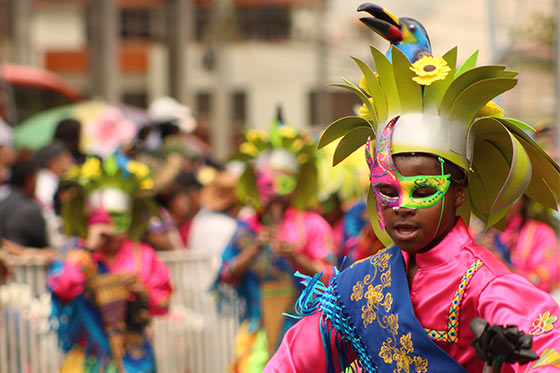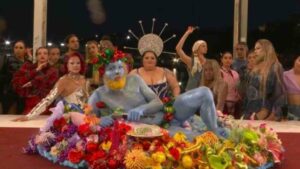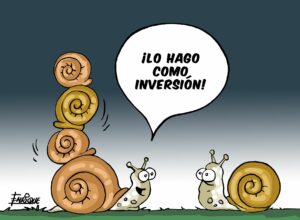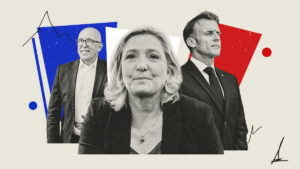
Why does a Special Rapporteur on Human Rights (in culture) visit us?
|
Getting your Trinity Audio player ready...
|
Consuelo Contreras Largo, the social worker from the U of Chile who directs the National Institute of Human Rights, recently reported that the UN Special Rapporteur on Human Rights in Culture, Alejandra Xanthaki, will visit Chile between March 25 and April 2024. .
As far as we know, it is the first time that such a visit has occurred in the country. What could be the reasons for a report of this nature? What further meaning could that visit have?
It is likely that few remember it anymore, but when in past decades UN human rights rapporteurs used to come to Chile, it was because complaints from multiple sources drew the attention of the international community to the possibility that the guarantees that the Declaration were being violated. Universal Human Rights of 1948 advocates. In those years the rapporteurs shook the entire country after complaints of political persecutions, torture, disappearances, restrictions on the press, etc. It inevitably culminated in a condemnation of the Chilean government for human rights violations. Bad thing.
In these postmodern times, however, a cultural rights rapporteur would come to verify whether we Chileans have generated a system that fulfills the right to participate freely in cultural life, the right to enjoy the arts, the right to rest. and leisure and respect for the freedom of scientific research and creative activity, the right to enjoy the benefits of scientific progress and its applications, among others.
It happens that the scope of the so-called "cultural rights" has been stretching the concept to cover situations in human life that are very true, in fact, but that are hardly enforceable as a duty that a third party must provide us, unless the wild card of the State. They are pseudo-rights,
What (rights) are we talking about?
In her first report presented to the Human Rights Council, in June 2010 (A/HRC/14/36), Alejandra Xanthaki herself emphasized that there is no official definition of cultural rights and undertook to investigate, in a way exploratory the best way to distinguish which human rights can be considered cultural rights and define more precisely the content of these rights.
Although there are many explicit and implicit references to cultural rights in international instruments and the practice of human rights mechanisms, four are traditionally considered essential:
The right to education, enshrined in numerous international instruments, in particular articles 13 and 14 of the International Covenant on Economic, Social and Cultural Rights and articles 28 and 29 of the Convention on the Rights of the Child. As emphasized in the World Declaration on Education for All (1990), people develop their own particular worldviews and capacities, which are always evolving in a lifelong process of education, and it is education that enables access to knowledge, values and cultural heritage
The right to take part or participate in cultural life, which is widely mentioned in human rights instruments, and in particular in article 27 of the Universal Declaration of Human Rights and paragraph 1) article 15 of the International Covenant on Rights Economic, Social and Cultural. The Committee on Economic, Social and Cultural Rights through General Comment No. 21 clarified the scope and content of this right.
The right to enjoy the benefits of scientific progress and its applications, enshrined in article 27 of the Universal Declaration of Human Rights and article 15, paragraph 1 (b) of the International Covenant on Economic, Social and Cultural Rights.
The right to the protection of the moral and material interests derived from all scientific, literary or artistic production of which the person is the author, enshrined in article 27 of the Universal Declaration of Human Rights, article 15 paragraph 1 (c) of the International Covenant on Economic, Social and Cultural Rights. In 2005, the Committee on Economic, Social and Cultural Rights approved its General Comment No. 17 regarding this right.
To this initial list from the 1950s, in the following decades, a string of new principles recorded in various international instruments and studies were added, causing, in practice, that the catch-all of cultural rights ended up being related to a large diversity of issues, such as expression and creation, including in various material and non-material forms of art, information and communication, language, identity and membership in multiple, diverse and changing communities, the formulation of specific visions of the world and the search for specific ways of life, education and training, access, contribution to and participation in cultural life, as well as the realization of cultural practices and access to and enjoyment of heritage, in all its forms. tangible, intangible, natural and mixed manifestations.
Evidence of this confusion and confusion was the constitutional dispute in which the issue of cultural rights appeared as an item on the agenda of the progressive left, which did not hesitate to include many of the aforementioned rights in the list, including the right to all people to rest and leisure, as stated in article 24 of the Universal Declaration of Human Rights.
In my post on Cultural Rights and Policies that you can see here https://cristian-antoine.blogspot.com/2020/10/politicas-y-derechos-culturales-algunas.html I develop a little more detail, such as the legal texts and constitutional rights have, in this context, an important role to play, as they are the concrete way in which different countries organize themselves to satisfy the cultural rights of citizens.
Just as a counterpoint for my foreign readers, it is worth mentioning that historically the State of Chile has assumed an active attitude, promoting and encouraging art and culture. This commitment is reflected in article 19, no. 10 of the current CPCh, which explicitly mentions that: “It will also be up to the State to promote the development of education at all levels; "stimulate scientific and technological research, artistic creation and the protection and increase of the nation's cultural heritage."
Chile is also a signatory of the UN Universal Charter of Human Rights approved on 12/10/1948, which establishes in its Art.27 that «1. Every person has the right to freely take part in the cultural life of the community, to enjoy the arts and to participate in scientific progress and the benefits that result from it. 2.- Every person has the right to the protection of the moral and material interests that correspond to them due to the scientific, literary or artistic productions of which they are the author.
International treaties legitimately signed by the country govern as laws in this Republic. And the UN is one of them, but not the only one. On October 16, 1966, the International Covenant on Economic, Social and Cultural Rights was approved. Chile ratified it on 1/3/1976. In its article 15 it states: “The states parties to the present pact recognize the right of every person to: a) Participate in cultural life, b) Enjoy the benefits of scientific progress and c) Benefit from the protection of moral interests. and materials that correspond to it by reason of the scientific, literary or artistic productions of which it is the author.
In short, we have had full legal validity of cultural rights since the mid-seventies of the last century. Precisely this point was put forward as a fundamental reason when proposing, a few decades later, the need for the creation of the National Council of Culture and the Arts.
Cultural rights, it will be said, protect the rights of all people, individually and in community with others, as well as groups of people, to develop and express their humanity, their worldview and the meaning they give to their existence and their development through, among other things, values, beliefs, convictions, languages, knowledge and the arts, institutions and ways of life. It is also considered that they protect access to cultural heritage and resources that allow these identification and development processes to take place.
Are cultural rights violated in Chile?
It all depends on the thermometer used. By "thermometer" I refer here to the so-called "instrument bias", a reference used in research methodology to refer to the "influence" that the "type of instrument" used to measure or collect data can have on the " conclusions" obtained in a study. This bias can affect the “validity” and “reliability” of the results. This is not the place to delve into this matter, but instrument bias occurs when the “measurement method” or “instrument” used introduces “systematic distortions” in the data collected. It is evident that the "objectivity" of the measurements can be affected. This has been known for a long time, and it forces the scientist to be extremely cautious with his statements and the public decision-maker who uses these data to generate public policy provisions, for example, also to act with the same seriousness.
This is precisely what I believe does not happen with the Chilean NHRI, which in its entries on "Culture and Human Rights" introduces statements such as that "Many studies indicate that in Chile there is profound inequality in access to culture, strongly determined by the socioeconomic situation of people. This means that those who belong to the most privileged groups tend to have more frequent, more intense and diverse cultural participation. On the contrary, among the most vulnerable sectors will be those who have never accessed cultural goods and services or those who only do so very rarely.«. The logical derivative, you will guess, is to generate cultural services of the State that provide "cultural and artistic content" that is paid for by everyone's taxes, even with those who have no interest in those contents and in full use of their faculties would never pay for an entrance or a ticket to attend those "shows."
No one will deny the ideal that every man in the world would have a well-equipped modern and friendly museum nearby, or that movie tickets or books would be cheaper. But understanding those ideals as rights is a very different matter. Whose responsibility does it fall to equip the museum's collection, price the books and organize Celtic music recitals? The most obvious answer is for the government to be the obligated party to these pseudo rights, but this does not solve the problem of the infrastructure and conditions to comply with that obligation.
Pseudo rights do not clarify who or how. Does anyone have a right to a job they are not interested in?
Although “cultural rights” are not as specific and codified as other rights, such as civil and political rights, they are recognized through various international instruments. Violations of cultural rights can manifest themselves in various ways. Here is a table made by AI with some categories of violations and associated examples or explanations. In some cases "intelligence" must give a second test. In any case, the list serves to start a conversation on the topic.
Let's look at number 1. Not to place. Nobody claims that their works are censored in Chile.
With respect to the second paragraph of the list that we are commenting on, which refers to the right to cultural identity, to know and be educated about the various cultures, as well as to express oneself in language or language, as far as any person in the country knows. they are deprived of their right to have a cultural identity.
Whatever she wants. The one you have, the one that occurs to you and in the form and manner in which you conceive it.
Nor have I seen any case, at least not one that has transcended the public domain, of any person or group of people organized into a "community" who is prevented from being educated in their culture and from being able to express themselves in their language and in their own language.
And that is because the Constitution that governs us guarantees the most unrestricted right to freedom of expression. Where naturally, the "expression" of one's own culture is guaranteed. By the way, the fact that someone has the "right" to express themselves in their own language does not force anyone to listen to it or try to understand it. Participation in the communicative loop is still voluntary, and no one can be forced to listen to something in a language that they do not understand and are not interested in using. So it is well done to protect the native languages, but it does not follow that Kunza should be included in Chilean education programs.
The numerals 2 and 3; 6, 8, 9 and 10 have traditionally been the claim of non-governmental organizations and other groups that also tend to align themselves to the left of the political arc and that were about to approve the first version of the Constitution of the Convention that was massively rejected by citizens. a few months ago. The most consistent is the one that refers to "lack of participation."
Stake?
Lluis Bonet, a prominent Catalan economist who has greatly influenced the consolidation of an academic space for the management of culture in Spanish and Latin American universities, says that one of the main paradoxes of contemporary politics is the promotion of participation, a obsolete value in our current societies given over to individualism and consumption (Bonet, 2005; Brugue). We live in a time of demobilization of political and union activism, but also of all types of active volunteering in social and cultural entities. The reason for this unreason, argues the Catalan specialist, comes from the realization that the more individualistic society is, the more need it has for collective values. Those responsible for cultural action know this, because although they express differences in the way of conceiving the presence of the State in the symbolic sphere, they usually agree that the decisions they make in this area are animated by the noble desire that citizens “participate” in culture and the arts.
Of course, this citizen participation that is announced is not usually done considering their presence in the design or in the conception of the set of decisions that will affect their possibilities of being able to fully enjoy – if they want – their cultural rights, especially at the local level, which is closest to one's own situation at a given time and in a given historical moment.
Citizen participation is an essential part of a democratic system (Bravo, 2007). An unavoidable task of democracy is to promote and strengthen processes and tools that contribute to ensuring that people's rights and duties are fully recognized and exercised and that a true exchange occurs between citizens, the State and its powers. Citizen demands and proposals require the construction of spaces, instruments and procedures through which citizens can express themselves about what directly affects them, and have something to say in relation to the decisions that administrative bodies adopt and the ways that they are adopted. they use for it. Our country incorporates with increasing emphasis instruments that favor this trend, among them participatory budgets, or citizen initiatives of Law.
For our cultural policy, citizen participation is also an imperative for the recognition and exercise of cultural rights. In this context, spaces for culture and the arts can be defined, interrogated and projected as instruments that favor or hinder citizen participation, and even the construction of cultural citizenship itself. And we refer here to cultural spaces in a broad sense that includes their territorial and architectural expression, artistic management and dissemination networks, the use and appropriation of territories and properties that have meaning for a particular community, the media. as areas of creation, dissemination and homogenization of aesthetic senses, among others. But hey, that's the subject of another post.
Finally,
Who is the rapporteur who will visit us?
Alexandra Xanthaki is a Professor of Law at Brunel University London, United Kingdom. A leading cultural rights expert, Alexandra has published on the topics of cultural rights of minorities and indigenous peoples, cultural diversity, cultural heritage, balancing cultural rights with other rights and interests, and multicultural aspects of legislation international on human rights.
She is Greek and graduated in Law from the Athens Law School and qualified as a lawyer. He then moved to the United Kingdom and completed a Master's Degree (LLM) in “Human Rights and Emergency Law” at Queen's University in Belfast. He completed a PhD at Keele University, UK, on “Indigenous Peoples' Rights at the United Nations” under the supervision of Patrick Thornberry. His work on the cultural rights of non-state actors is well known and has been cited repeatedly in international documents. He has worked on issues related to human rights with NGOs and civil society. Before assuming the mandate, Alexandra has worked closely with several United Nations mandates and has advised several States on human rights matters. He has also taught classes to officials and lawyers in various parts of the world, such as Ukraine, Vietnam, South Africa and Malaysia.
Let's see how it goes. As they say on TV, we will continue to inform…
Project management
Advanced
Teamwork
Half
Execution time
Short term









